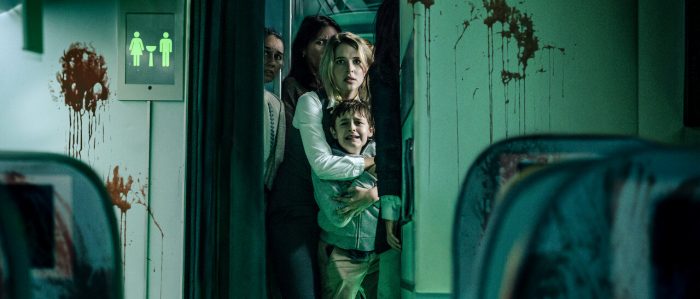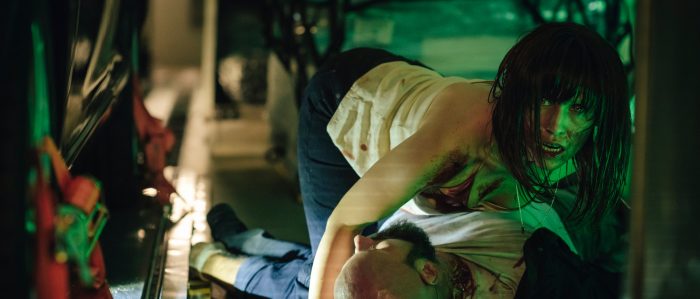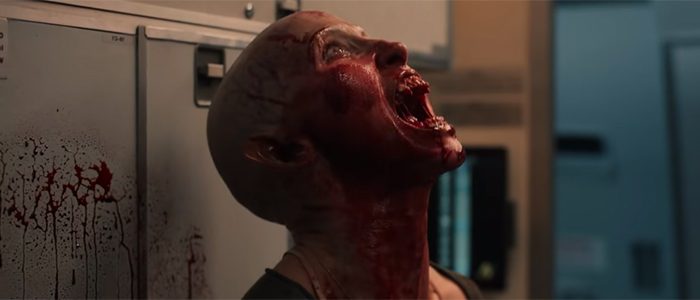
In the new Netflix film from director/co-writer Peter Thorwarth, Blood Red Sky, two things become eminently clear early on: there are a hijackers onboard a red eye flight from Germany to America; and there’s a vampire, Nadja (Peri Baumeister), amongst the passengers as well. And the only things keeping her from feasting on those around her are a mysterious drug she injects herself with periodically, the fact that this is a night flight, and the presence of her young son (Carl Anton Koch), who looks out for her on the journey. When the hijackers threaten all three of the elements keeping her hunger in check, they force Nadja to take action and unleash the dark side of herself that she’s fought long and hard to hide.
Among the terrorists are such notable action stars as Dominic Purcell, Roland Møller, and relative unknown to non-German audiences Alexander Scheer, who steals scenes with great abandon as Eightball. Also working primarily in Germany, director Thorwarth had a tough time getting Blood Red Sky off the ground since he’d made almost entirely comedies (with such zany titles as If It Don’t Fit, Use a Bigger Hammer) before this. But the results are brutal, blood-soaked, tense, and claustrophobic, since nearly the entire film takes place on the upper and lower floors of the airplane. And the filmmaker wasn’t afraid to tinker with the rules of vampirism just a bit.
/Film talked with Thorwarth recently to discuss exactly how long he’s been waiting to make a monster movie, the impact From Dusk Till Dawn had on him, and the challenges of shooting an action movie on a cramped airplane set.
For people who aren’t familiar with your films in Germany before Blood Red Sky, I think I can safely say you’ve never made anything like this before.
Not since I was 13 [laughs]. I started shooting movies with friends of mine with all of our pocket money, which we invested in our little films. But yes, when I was 13, I wanted to do horror movies, but I ended up doing comedies, without any intention. So I stayed with this kind of humor because I became known in Germany for comedies, dark comedies, of course. It was actually pretty hard for me to convince people that I could do something else. It took me 16 years to get this movie financed.

Was some version of this story the one you’ve been sitting on for 16 years? What are the origins of this story?
Actually, it began when I was on an overnight flight, looking out the window at the surface of the clouds, and I started to think if I were a vampire, I’d have to organize myself and book red eye flights. And if this gets hijacked, the hijackers would turn the plane around back toward the rising sun, I have a problem. And then I realized, no, it’s not me that would have the problem; it’s them that have the problem. I’m a vampire with certain skills that I can use like a superhero. This was the first idea. Later on, I wrote the first draft with a close friend of mine [Stefan Holtz], and we envisioned something that had a tone like From Dusk Till Dawn, which was very much how I was feeling at the time.
When I first saw From Dusk Till Dawn, it was in Munich at a press screening, and I freaked out because I’d never seen something like this. Then I found out that there was going to be a premiere in Germany, and I was a film student at the time at the Munich Film School, and I went to the venue because I heard that after the premiere that all the guests would be shuttled by buses to the location where the party was. What I did is something that wouldn’t be possible today because of security, but I used the backdoor of the cinema and waited behind the screen, reading the subtitles. But behind me were two people, and I turned around, and it was Robert Rodriguez and Salma Hayek. Without thinking about it, I said, “Guys, I saw this movie before, and I’m a film student and this is the biggest thing for me, seeing something like this.” And Robert Rodriguez asked if I was invited to the party, and I told him I didn’t have an invitation, so he brought me there. It was so funny, because it was outside of Munich, they had this place made to look like the Titty Twister, and it was so fun.
But my first draft of the script was a little bit more fun than the story is right now. As I got a little bit older and now I’m a father, I thought maybe it needs a little bit more that just a cool pitch with punchlines. Maybe the vampire needed to be a mother who was bitten when she was a young mother, and her husband was killed, and the little boy is still just a boy. And I think this drama and emotional arc that leads you through the movie adds a level to the film. I thought this was a really cool idea, but a lot of people I talked to about it said, “This is not going to work. Either do a horror movie or do a drama, but mixing them us is not going to work.” But I never believed it.
Universal International came to me about eight years ago when I was shooting another movie for German cinema. They read the script and said “Let’s do this movie.” Somehow it didn’t work out when the person who called me left the company. The project stayed with Universal International for a while and we tried many approaches, including getting an American lead, which seemed silly because she is from Europe. Why cast an American star just for financial reasons? I mean, I get that totally, but it didn’t make an sense for the story. Then two years ago, the same person called me again while I was editing my last film and asked “What about this Blood Red Sky project?” I had a financier who wanted to extend the option, and we were going to meet about it at Cannes, and he said “Don’t do it.” He was building up Netflix London and wanted this to be his first movie, so we did it.
It’s that very blend of drama and horror that makes the film work so well. People are going to care about what happens to this mother and son. She torn between letting that animalistic side of herself go and protecting her son. Were there moments in the script or during shooting where you had to pull back and remember that the emotional core of the film is about this relationship?
Yes, you’re absolutely right. That is the key. We didn’t have the chance to show the film to a lot of people because of COVID, but I realized that people who are not fans of the genre also liked the movie. They would say “This is normally not my thing, but I was so touched by the leading actress and the boy, Peri and Carl, and their relationship. This lead us through the whole movie.” While we were shooting, Peri intentionally did everything right, so I didn’t have to direct her much. Even during the casting process, she did everything right. Then later on, she’d say, “I wasn’t good enough. Should I do it differently?” and I said, “No, Peri. Relax. It was perfect.” But we let her do a couple of takes of some scenes, but she usually came around to the way she did it the first time. It was quite easy for me to direct her. I never forgot the emotional aspect of things and neither did she.
Also, I had a great DP, Yoshi Heimrath, and this might have been the first time I realized what it meant to have a director of photography, because when I realized that he knew everything about the movie, I could hang back and concentrate on directing the actors. It was perfect and really fun.

Because of the close quarters of your airplane sets, the way the vampire makeup progresses, and how the tension ramps up gradually only in one direction, I suspect that you shot this more or less chronologically.
That was absolutely my idea in the first place, from the beginning. We had the whole plane on the soundstage, but because of COVID, our whole schedule had to change, which ended up being perfect since 80 percent of the story takes place on this plane. We had everything built: the cockpit, business class, economy—we actually used the economy set twice, for the rear and middle sections. We just redressed it a little bit; it wasn’t a big deal. This worked out perfectly. And since we shot everything on stage and in order, my editor worked at night cutting it together, so I could look at it first thing in the morning and I’d know “This is not going to work,” so it was easy for us to reshoot extra shots while we were shooting.
The only big fuck-up to production was COVID. We started shooting in March 2020 for seven days. Thankfully, we did all of the exterior shots first, at a small airport near the Ukrainian border, in the far east of Skovakia, which we redressed digitally to look like a military base in Scotland. Then we went to another airport to shoot some other scenes, and just as we were wrapping those up, we had the first cases of COVID in the Czech Republic and Germany, and we had a strange thing in Germany where we had about 1,000 cases of COVID and only 30 cases of the measles. And one guy on our set got the measles, so while we were shooting in the airport with 100 extras, there were some guys on the production team who handed out the first masks, which made us all freak out because we realized COVID was here.
Until then, we hadn’t shot in the plane, so we had more time to work on the set design, and it felt like a new beginning. Psychologically, it would have been strange to start shooting on the plane, then stop, then go back. So for the team, it felt like a fresh start. There were a couple times where we had scheduling situations when we needed to divide the production into different groups, with the core group of the directors and main cast, which were not supposed to have contact with the other groups. It worked pretty well until an extra got COVID, and we had to stop and quarantine everyone for 4-5 days. Then we had the added pressure of shooting with a little boy. The guys responsible for him said he had to go back to school on a certain day, and we would have had to bring him back during a break and shoot without him, which simply wasn’t possible. So between that deadline and starting and stopping a couple of times, it was exhausting.
One actor I wanted to talk about, because he impressed me so much, is Alexander Scheer. I don’t know if I’ve seen him in anything before this but he is certifiably psychotic in this movie. It feels like you just threw him into a scene and said “Do what you want to do.” He’s that unpredictable. Tell me about his energy and what he brought to the proceedings.
I’ve known Alexander from my days in Berlin, almost 20 years ago. I know he started as I did. He was a guy who loves horror movies, shot horror movies with his friends, so I knew he was very into it. I always was thinking he might be the guy for this role because he’s certifiable, as you say, and about three years ago, I had to hand over a German film prize on stage to a friend of mine, and at the same event, Alexander got an acting prize for a German social drama he did, and he freaked out on stage, and I said, “This is exactly the guy I need for that role.” He was crazy but not an asshole [laughs]. I sent him the script, and he freaked out. This is exactly what he wanted to do, and his energy was crazy, and it was so fun shooting this movie with him. But the combination of him and Dominic Purcell, who is the straight-forward leader of the mercenaries, and with Alexander playing psychotic, we knew there was no way those two would work well together for long.
Do you think you’ll make another horror film sometime soon? Was it a fun enough experience that it opened up that part of you to try another one?
Peter: Probably because to me, it isn’t a horror movie. I have a new script that’s almost done, that’s more like my kind of humor, and it’s a swan song to the knighthood, set in Medieval times. There’s a bit of humor, but it’s also a tough story. Hopefully I will do that next.
***
Blood Red Sky begins streaming on Netflix beginning Friday, July 23, 2021.
The post ‘Blood Red Sky’ Director Peter Thorwarth on Putting a Vampire on an Airplane [Interview] appeared first on /Film.
0 Comments